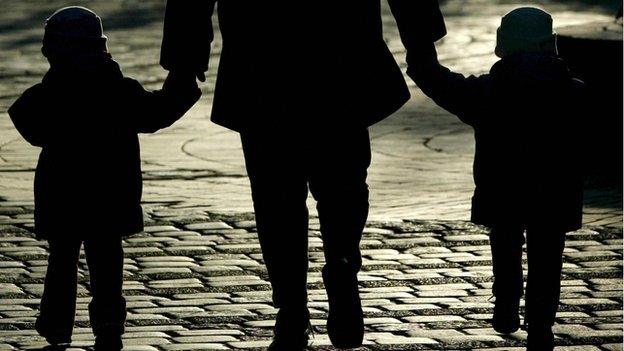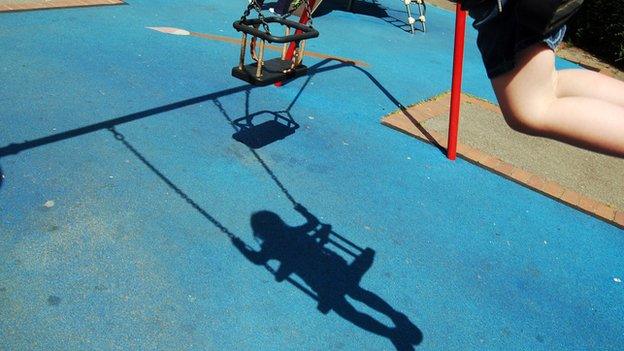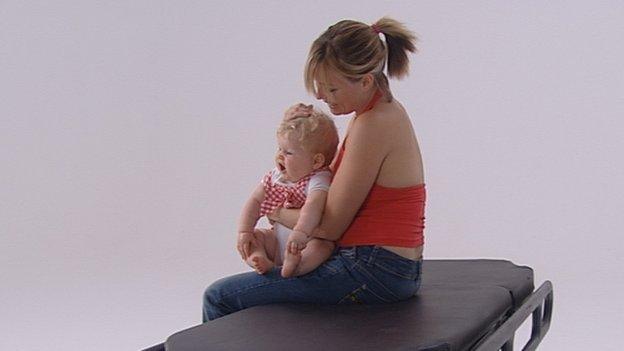Children's social problems 'cost £17bn a year'
- Published

Making families wait until their problems are hard to solve is ineffective and expensive, argues the report
Dealing with acute social problems affecting children and young people in England and Wales costs £17bn a year of public money, suggests research.
Some of the cash would be better spent on addressing the root causes of problems, argues the report by the charity Early Intervention Foundation.
Prevention would not only save money but could "transform children's lives", say the authors.
The government said it had taken action to improve all children's chances
The researchers analysed official statistics on the costs of addressing social problems including mental health issues, going into care, unemployment and youth crime.
'Blighted' lives
Of the £17bn total, some £5bn is spent each year on children in care, £4bn on benefits for 18- to 24-year-olds not in education, employment or training and another £900m on helping young people with mental health issues or drug and alcohol problems, say the authors.
Local authorities bear the largest share of these costs at £6.5bn while welfare spending is £3.7bn.
The NHS, schools, police and the criminal justice system also share the bill.
The authors say making children and their families wait for help until their problems are acute is both expensive and ineffective. Late intervention "rarely turns lives around", they warn
"What these figures represent is merely the immediate impact on the taxpayer of thousands of lives blighted by thwarted potential and missed opportunities."
The focus should shift "from picking up the pieces to giving everyone the best start in life", they argue.
'Different journey'
"Many of these children and young people might have had a different journey if they or their family had received the right help at an earlier time."
The report challenges the next government to redirect resources into prevention, with late intervention spending reduced by 10% or £1.7bn.
It says agencies should must co-ordinate services better, "to put those most in need at the centre", avoiding duplication and waste.

Early Intervention Foundation chief executive Carey Oppenheim said: "Our research lays bare how much the government spends each year tackling the social problems that early intervention is designed to prevent.
"Yet our public services remain increasingly geared towards picking up the pieces from the harmful and costly consequences of failure."
Sir Tony Hawkhead, chief executive of Action for Children, called the report an "impressive economic analysis".
"It serves as a stark reminder of the great human cost of social problems that are all too often preventable if we act earlier."
Funding reform
Local authorities said they recognised the benefits of early intervention but struggled to deliver it under the current funding system.
"All too often the savings from investment by one agency are recouped by another, resulting in disincentives to invest in early intervention," said councillor David Simmonds, chairman of the Local Government Association's children and young people board.
Mr Simmonds said it was essential money was "available flexibly to local communities where it can be most effectively put to use".
"We urgently need to reform how funding is allocated across local services to encourage joint working and savings to encourage investment in early intervention that shifts the balance from crisis spend towards prevention."

The government said its plan to give every child the best start in life was working
The government said it had increased early intervention funding, introduced free early education for disadvantaged two-year-olds, placed a fresh focus on improving young people's mental health, and driven up school standards.
"Our plan is working. The number of young people not in education or training is now at its lowest level since records began, youth unemployment has been falling dramatically, fewer young people are entering the criminal justice system, children in care are doing better at school and absences have decreased, foster children can now stay at home until 21, and this year a record number of children found places in stable, loving homes through adoption.
"We give councils the freedom to use their funding to meet the needs of young people in their area.
"We know the best councils take advantage of this to look for innovative ways to intervene and avoid problems later on.
"The earlier we can tackle issues the better, but this must be based on clear evidence. This is precisely why we set up the Early Intervention Foundation to advise on how best to respond to this challenge."
- Published19 January 2015

- Published30 October 2012
